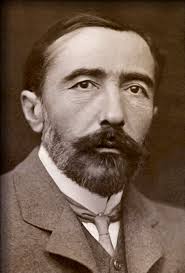The life and writings of Joseph Conrad fascinate me.
He was born Józef Teodor Konrad Korzeniowski in the area of Poland annexed by Russia after the partitioning of my country at the end of the 18th century. His father was a highly educated person. Writer, translator and would-be-revolutionary member of Polish nobility (szlachta). While a young boy, Józef was walking the same streets of Warsaw I walked during my school years. Apollo Korzeniowski was arrested by the Russian secret police and held in Pavilion X in Cytadela in Warsaw. This dungeon-like complex was a detaining place for political prisoners. The wall, where many of them were shot, is still there. I know. It was located within the walking distance from my apartment in Warsaw and now is open to the public. I used to play soccer there with my friends. There are still stories of soldiers committing suicides in this miserable place.
Young Józef was lucky, though. His father and the family were only exiled to Siberia, a place from where only a few returned. Tsar Alexander II didn’t tolerate any dissent. While growing up, Józef learned French, which at that time was a language of the educated, higher class he was a member of. He had read French and English writings, but he was really fascinated by long patriotic Polish poems with clear political overtones by Mickiewicz and Slowacki. I know them, I grew up reading the same literature, too. When I went to school, all students to recite at least a few verses of each. Józef’s third given name was Konrad, after a hero of one of Mickiewicz’s epic poems. It became his surname name in Britain.
One of the nightmares in Russia was a twenty-five years military service for young men. It was like a death sentence for most of them. The rich were bribing the poor to participate in the lottery in their stead, the others tried to leave the country. The Older Korzeniowski took his family to part of Poland occupied by Austria, where intellectual and political environment was much more relaxed.
Since he spoke perfect French, the young man without a country ended in France. There he enlisted to be a merchant marine sailor. One of the writers he was fascinated by at that time was James Fenimore Cooper. I also remember him. Cooper’s novel The Last Mohicans was a must-read for us while in the elementary school.
Then he was notified of the agreement between the French and Russian governments prohibiting the former from employing young men who may be subject to military service in the latter. So Joseph traveled to Britain.
There he began writing in the language, which was even not his second. And not even third, as surely, he spoke Russian being raised in that oppressive country. All his novels, and I read quite a few of them, have maritime roots. For me, they were sometimes hard to read, at least at the beginning. Not because of his 19th century English, but because of the sometimes difficult way to convey the message and awkward, at times convoluted syntax. He uses ship’s scenario to present different characters and puts them in difficult physical and moral conundrums. The tight ship’s space lets him put all the dramatis personae in one closed place, same like a stage for a play writer. It eliminates many outside distractions and at the same time intensifies internal conflicts. It’s like playing music in a closed room with empty walls. Every sound gets amplified exponentially. Can someone use the closed, tight space of the operating room for that purpose? Hm…
Young Conrad didn’t have an easy time. He was battling depression for most of his life. Tried to commit suicide at the age of twenty. He spoke with a heavy accent and often was mocked for that. His two sons never learned Polish, and he was blamed for that too. It sounds familiar to me, but by now I know it takes the other side to be willing to learn. However after years of writing, he was finally not only accepted but also admired as a writer. Then, the choice of language in his writing was often criticized. His French was apparently better than his English. And why not Polish, a country of heritage he was so proud of?
Not too many people realize how tough the Polish language is. It was judged to be one of the most, if not the most, difficult languages to master (I don’t know how they did the study, but don’t disagree with the results). Mickiewicz, Słowacki and Krasiński (Three Bards) put Polish literature on such a pedestal, that nobody even comes close. It was the same with Beethoven in music and Shakespeare in English literature. And after reading their works, Conrad apparently decided he couldn’t express himself equally well in the native language up to his satisfaction. French was a close second. So English was a default language. Sounds so familiar to me.
Still, many claim him as an English writer. Conrad was as much English as Chopin was French.
About that next time.


